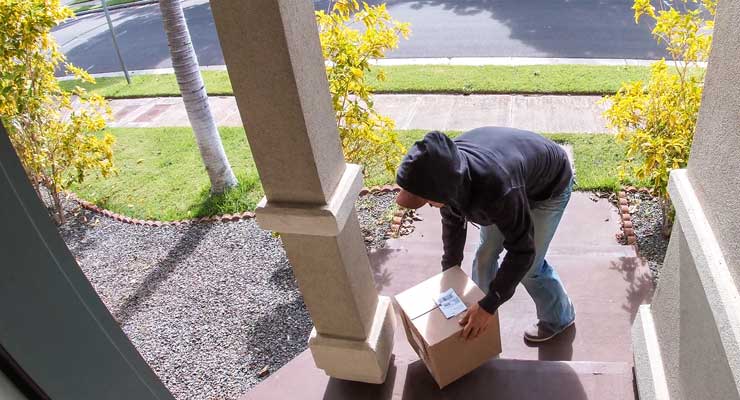Porch piracy will be one of the biggest obstacles facing e-tailers this peak season, with 210 million packages disappearing from front steps every year. According to data from UPS Capital, American households experience two instances of porch piracy each year. Because of this, consumers are demanding for better protections around their shipping.
The Costly Impact of Package Theft
“Porch piracy has costly impacts on consumers, retailers, and carriers. These costs are not only financial expenses related to merchandise replacements and reshipment fees, but also soft costs, like reputational damage,” Mark Robinson, President of UPS Capital, said. “This customer frustration is damaging to retailers and carriers due to the blame that customers place on both providers. According to a recent UPS Capital commissioned study, 83 percent of consumers believe carriers are responsible for shipment issues, while close to half of consumers will not shop from small to medium size businesses again if they do not resolve a stolen package claim.”
Steps to Take for Package Protection
According to Robinson, there are a few steps that retail businesses can take to help combat porch theft this holiday season:
1. Work with Your Carrier
Retailers should first work with their carrier to understand the type of delivery resources that are available to them, as well as the delivery solutions that they can present to their customers.
2. Live Shipment Tracking
This, along with signature requirements, are beneficial to both retailers and consumers, as it adds the assurance that the customer is home when the package is delivered. However, if customers are not certain they will be available to receive a shipment, customized delivery options, like selecting specific delivery days through time-definite carrier services, are also helpful and often preferred by shoppers.
GBT Technologies offers a GPS-less tracking system that allows retailers to track packages over long distances via electromagnetic waves. It works very similar to the Air Tag from Apple, but they have created their own technology in which retailers can order these tracking systems in bulk for cheap, attach them to packages like a small bandage, and be able to see the shipment’s delivery process from start to finish.
3. Partner with Secure Lockers or Local Stores
Additionally, presenting customers with the option to send their deliveries to secure lockers or local store partners can offer delivery assurance. Shipping their goods to locations that they deem more risk averse, such as their place of work or a friend or family member’s home, can be a more appealing consumer option.
4. Offer Shipping Insurance
Lastly, providing customers with an option to elect to cover their purchase at checkout directly, or provide shipping insurance, presents added peace of mind for shoppers and retailers in the case of porch piracy.
Delivery Fraud a Growing Trend
Businesses are seeing double the losses reported from residential addresses, with many resulting in the resident claiming their package never arrived or was stolen, but further investigation showed that their claim was untrue. Delivery fraud is even turning into a for-hire industry and “professionals” are getting paid to conduct this fraud on behalf of their customers. Robinson says he has also seen fraudsters digitally manipulate return labels and return notifications in order to keep merchandise and receive refunds.
“Delivery fraud presents a challenging issue to multiple industries as retailers, carriers, and credit card companies are all impacted,” Robinson said. “In order to address this growing issue, it will take leaders across these industries to come together and address this increasing fraud.”
To prepare for a situation like this, Robinson suggests that retailers keep detailed records and leverage sophisticated trend and data analysis to help identify fraud and reduce any threats. For example, brands can help catch repeat offenders by flagging customers who have used the same name and address in multiple stolen package claims.
How Retailers Can Get Through the Holidays
Despite the challenges associated with porch piracy, retailers still have ways to ensure that their customers receive a positive shipping experience this holiday season. While shipping mishaps are inevitable, brands should proactively familiarize themselves with their shipping insurance policies, while also exploring options for their customers to elect protection at cart checkout. A recent UPS Capital study found 51 percent of customers want the ability to add shipping insurance to protect their deliveries from issues like porch piracy.
According to Robinson, other ideas include:
- Validating your customer before shipment of high-value items. Keep records of returns and other claims to address potential future purchases. If the results are suspect, ship to a business location.
- Refunding returns upon receipt of the goods.
- Ensuring your returns processes are watertight. Inspect returns immediately and under cameras, if possible, to minimize returns fraud and chargebacks.
With the proper processes and resources in place, retailers can manage the shipping experience, which not only makes customers happy, but can also boost brand loyalty and reputation.
“There are no signs of porch piracy slowing down — especially as the holidays approach. Porch pirates are opportunistic, and with an increase in deliveries expected to occur during the peak shopping season, we can expect to see an increase in package theft post-deliver. This means businesses need to be prepared for incidents.
Typically, once a carrier shows proof of delivery, their liability ends. Most shipping insurance coverage also ends there as well. With UPS Capital, merchants can readily insure all of their ecommerce shipments with us and be confident their shipments are covered, even in the case of porch piracy,” Robinson said.
